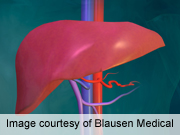
FRIDAY, July 27 (HealthDay News) — Current or previous smoking may increase the risk of hepatitis reinfection in people who have a liver transplant due to viral hepatitis, a new study suggests.
This may be because tobacco in cigarettes lowers their immune system response, according to Dr. Mamatha Bhat, of McGill University in Montreal, and colleagues.
For the study, the investigators analyzed data from 444 transplants conducted at the McGill University Health Center between 1990 and 2004.
They found that the average “viral hepatitis-free survival time” was less than one year for smokers and more than four years for nonsmokers.
The study was published in the July issue of the journal Liver Transplantation.
“Our findings suggest that recurrence of viral hepatitis may be more frequent among liver transplant recipients who are active or former smokers,” Bhat said in a journal news release. Encouraging patients to quit smoking after their transplant may improve their outcomes, she added.
The study results do not mean that smokers should be denied liver transplants, but suggest that doctors need to be more vigilant in monitoring for complications in patients who smoke.
“Organs available for transplantation are scarce, with livers particularly in short supply,” Bhat said. “Transplant centers need to take an active role in identifying and minimizing risks to the success of liver transplantation.”
While the study uncovered an association between smoking and the recurrence of viral hepatitis in liver transplant patients, it did not prove a cause-and-effect relationship.
More information
The American Liver Foundation has more about liver transplantation.

